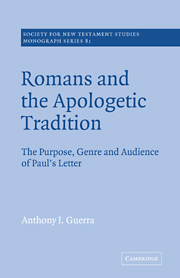Book contents
- Frontmatter
- Contents
- Preface
- List of abbreviations
- 1 Apologetic and audience: making the message meet
- 2 Apologetic motifs in Romans 1.18–3.31
- 3 Romans 4: the continuation of apologetic argumentation
- 4 Paul recommends and defends the gospel of God
- 5 Romans 9–11: Paul defends his mission to the Gentiles for the sake of the Jews
- 6 Romans 12–13 and 16: the “Roman factor”
- 7 Summary and conclusion
- Appendix
- Glossary
- Select bibliography
- General index
- Index of modern authors
6 - Romans 12–13 and 16: the “Roman factor”
Published online by Cambridge University Press: 17 August 2009
- Frontmatter
- Contents
- Preface
- List of abbreviations
- 1 Apologetic and audience: making the message meet
- 2 Apologetic motifs in Romans 1.18–3.31
- 3 Romans 4: the continuation of apologetic argumentation
- 4 Paul recommends and defends the gospel of God
- 5 Romans 9–11: Paul defends his mission to the Gentiles for the sake of the Jews
- 6 Romans 12–13 and 16: the “Roman factor”
- 7 Summary and conclusion
- Appendix
- Glossary
- Select bibliography
- General index
- Index of modern authors
Summary
Introduction
Our reading of Romans thus far has strongly suggested that Paul writes with an image in mind of two groups i.e. Jewish and Gentile Christians. In the chapters of Romans remaining to be discusssed, another aspect of Paul's image of his audience becomes apparent. Most significant in this section of Romans is the explicit political apologetic (13.1–7) which indicates Paul's attention to what I am calling the “Roman factor.” Paul is not only sensitive to the assumed Roman consciousness of Christians in the capital city but also concerned to protect the Christian community against civil disciplinary action as was experienced in the past. He must convince both Christian groups that he is a loyal subject of the Emperor and will not bring political catastrophe on the Roman Christian community, though this explicit political agenda should not overshadow the wider protreptic concern that continues to dominate even in this section of Romans. Thus, the persistent philosophical/rational characterization of Christian worship reflects Paul's appeal to the Roman consciousness and values which he presumes of the community addressed, and accords well with the protreptic task to promote a preferred way of life as both consistent with mainstream values, and also superior to them.
Romans 12.1–2: the rationality of Christian worship
From the opening verses (12.1–2) which serve as an introduction to the entire section (12.1–15.13), Paul insists that the worship of the Christian community in Rome be rational.
- Type
- Chapter
- Information
- Romans and the Apologetic TraditionThe Purpose, Genre and Audience of Paul's Letter, pp. 157 - 169Publisher: Cambridge University PressPrint publication year: 1995



